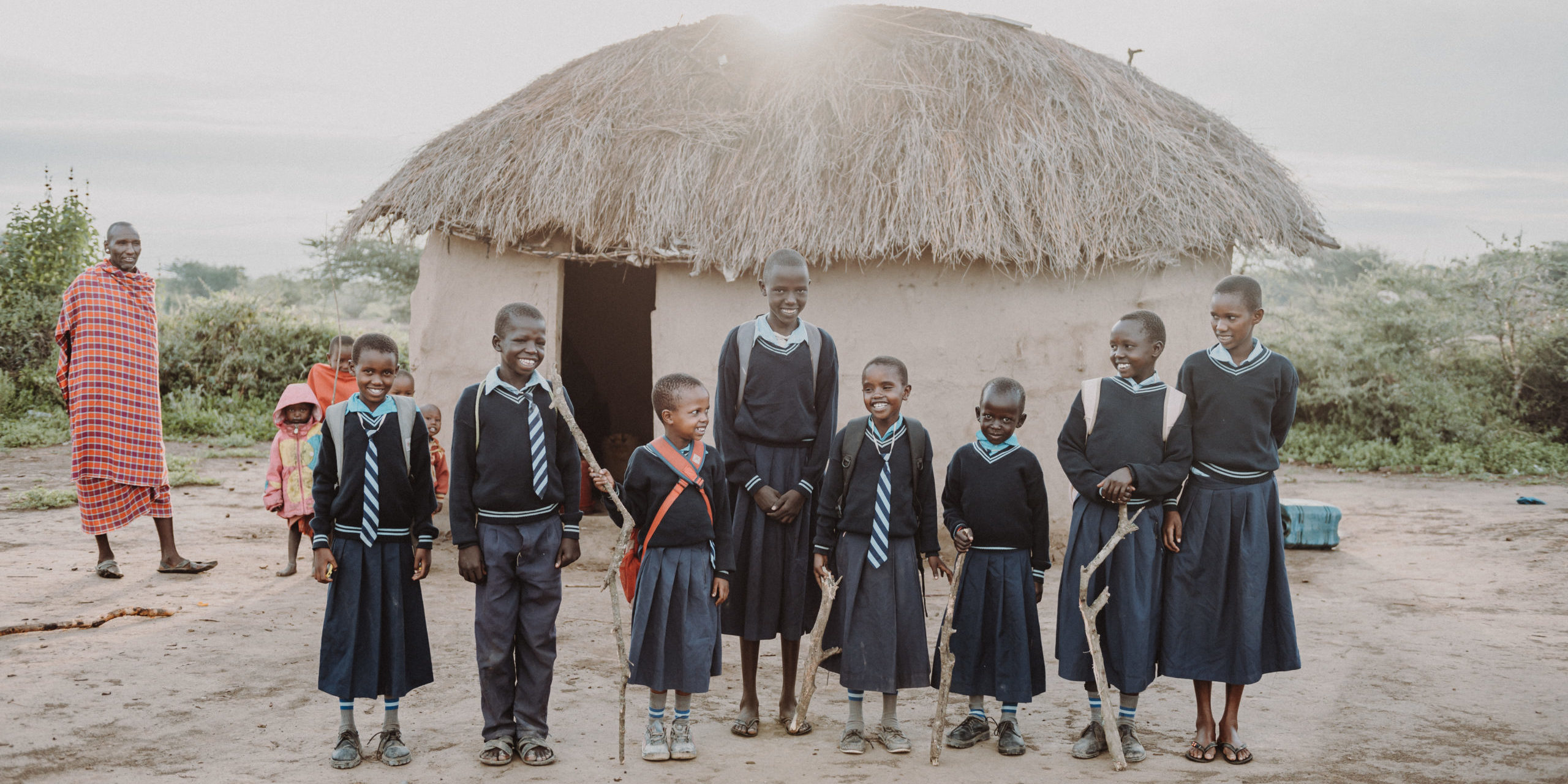We start out at dark, and first light becomes a crimson streak across the sky. The sound of our van lurching along the rocky terrain is mingled with cowbells and braying goats. We are in Engikaret, the “place of thorns,” in a Maasai region outside of Arusha, Tanzania. We are here to experience what it is like for these Maasai children to walk to school each morning.
By the time we arrive in the small village, women and children are already hard at work, milking goats to make chai over the fire smoking in their small boma. One husband greets us warmly and welcomes us inside. His wife and daughter are both sitting by the fire, stirring sugar into a pot of goat milk. Both have a baby about two months old – the reality of child marriage before our eyes.
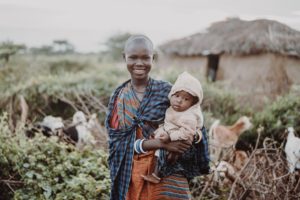 We crouch together around the small fire. Even with the sun beginning to flare from behind Mt. Meru, it is as dark as night, and smoky.
We crouch together around the small fire. Even with the sun beginning to flare from behind Mt. Meru, it is as dark as night, and smoky.
After the children have finished their chores and put on their uniforms, we set off on the two or three kilometer walk to school. Without them leading the way, I would have been lost – there is no path or road, and the mix of dirt and bush spreads out as far as I can see. Along the way, the children pick up firewood to bring to school – their required contribution in place of school fees. They glance back at us, trailing slightly behind, giggling over their strange companions.
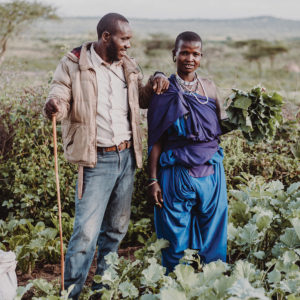 We don’t quite finish our walk with the children. As we near the school, our partner Edward pulls up in his van and calls us over to see something that until this year he had never seen among the Maasai of this region: a woman tending a beautiful garden. Her husband smiles proudly as she shows off the flowers and vegetables she is cultivating. New Vision School buys them from her to cook their meals for the children and staff. Nearby, their boma has the only solar light panel I’ve seen. Clearly these two are innovators.
We don’t quite finish our walk with the children. As we near the school, our partner Edward pulls up in his van and calls us over to see something that until this year he had never seen among the Maasai of this region: a woman tending a beautiful garden. Her husband smiles proudly as she shows off the flowers and vegetables she is cultivating. New Vision School buys them from her to cook their meals for the children and staff. Nearby, their boma has the only solar light panel I’ve seen. Clearly these two are innovators.
By the time we arrive at the school, students are lining up in the courtyard to sing their school song. This year there are over 300 students from preschool through primary. This is the next generation of Masai leaders.
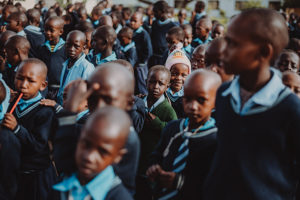 Later, I sat down with Edward to discuss the future of New Vision Engikaret. In the past four years, they have begun a social enterprise to bring more holistic community development into their funding model. Through generous donors and a small business loan from Loom, New Vision’s cow project has been growing steadily since 2017. Dubbed “the Moovement,” they are now up to twenty cows (including calves), who are currently producing about 60 liters of milk a day. Last year, Edward estimates they made about $800 a month selling milk, coming out to about two children’s education sponsorship per cow. But when asked about the project’s impact at the school, Edward points to the whole community.
Later, I sat down with Edward to discuss the future of New Vision Engikaret. In the past four years, they have begun a social enterprise to bring more holistic community development into their funding model. Through generous donors and a small business loan from Loom, New Vision’s cow project has been growing steadily since 2017. Dubbed “the Moovement,” they are now up to twenty cows (including calves), who are currently producing about 60 liters of milk a day. Last year, Edward estimates they made about $800 a month selling milk, coming out to about two children’s education sponsorship per cow. But when asked about the project’s impact at the school, Edward points to the whole community.
“Not only is it providing school fees, but the milk we sell [to the school and community] is providing much-needed nutrition, especially during a drought,” he says. “Now we are making enough income that we can employ two people to care for the cows, one who has a disability.”
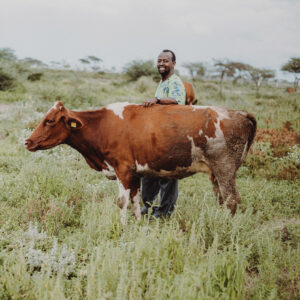
As of May 2020, a biogas digester has been completed on the property, which will use the
animal waste to create a free, clean energy source for cooking in the kitchen. What’s more, other Masai leaders have begun to keep milk cows. Before this project, they discouraged the idea, saying that it was not possible. The impact reaches beyond education to also create jobs, bring nutrition, and soon cleaner energy.
I asked Edward what he has learned from the past four years of launching this social enterprise. “It is good to start small with a business like this for the first time,” he said. “It gives you time to build your muscles as it grows. If you were just given a huge project right at the beginning, it would not be good. You learn as you go, from failure, from trying things.”
As Janna Moats says, “This is a guiding principle of Loom. The people we may have considered weak are truly the powerful. When it comes to people, Jesus’ life, words and values always push us to bet against the odds set by the society – to question the experts and the professional’s stronger voices.
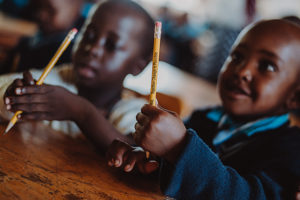 “The scripture continues to tell us: don’t bet on what your culture, your society, your institutions tell you is a sure thing – don’t invest in the powerful, the obvious, the most influential, the biggest. Watch for and invest in the least powerful, the poor, those with a small voice – those who HAVE to beat the odds to bring change.”
“The scripture continues to tell us: don’t bet on what your culture, your society, your institutions tell you is a sure thing – don’t invest in the powerful, the obvious, the most influential, the biggest. Watch for and invest in the least powerful, the poor, those with a small voice – those who HAVE to beat the odds to bring change.”
In Engikaret, change has indeed come slowly, but it has been won through the grit and determination of Edward, his family, and his faithful team. Through ten years of challenges and drought, they have refused to give up on the future of this community. To say we admire them is a desperate understatement. They are teaching us what it means to love, to persevere, to give our lives away for the sake of others. All it takes is five minutes in a classroom among these bright, energetic future leaders to feel the possibility of all that is to come.


